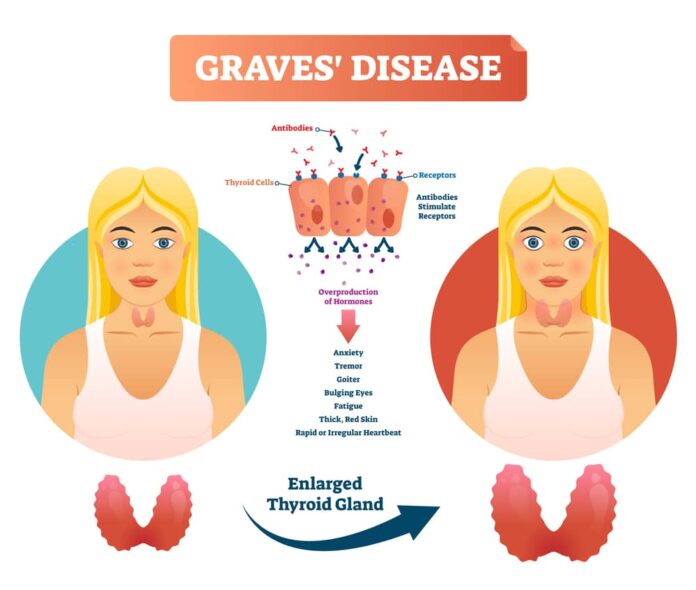Overview Of Grave’s Disease
Graves disease is an autoimmune disorder that leads to an overactive thyroid gland (hyperthyroidism). An autoimmune disorder is a condition that occurs when the immune system mistakenly attacks healthy tissue.
Commonly Associated With
Diffuse thyrotoxic goiter; Hyperthyroidism – Graves; Thyrotoxicosis – Graves; Exophthalmos – Graves; Ophthalmopathy – Graves; Exophthalmia – Graves; Exorbitism – Graves
Causes Of Grave’s Disease
The thyroid gland is an important organ of the endocrine system. The gland is located at the front of the neck above where the collarbones meet. This gland releases the hormones thyroxine (T4) and triiodothyronine (T3), which control body metabolism. Controlling metabolism is important for regulating mood, weight, and mental and physical energy levels.
When the body makes too much thyroid hormone, the condition is called hyperthyroidism. (An underactive thyroid leads to hypothyroidism.)
Graves disease is the most common cause of hyperthyroidism. It is due to an abnormal immune system response that causes the thyroid gland to produce too much thyroid hormone. Graves disease is most common in women over age 20. But the disorder can occur at any age and can affect men as well.
Symptoms Of Grave’s Disease
Younger people may have these symptoms:
- Anxiety or nervousness, as well as problems sleeping
- Breast enlargement in men (possible)
- Problems concentrating
- Fatigue
- Frequent bowel movements
- Hair loss
- Heat intolerance and increased sweating
- Increased appetite, despite having weight loss
- Irregular menstrual periods in women
- Muscle weakness of the hips and shoulders
- Moodiness, including irritability and anger
- Palpitations (sensation of a strong or unusual heartbeat)
- Rapid or irregular heartbeat
- Shortness of breath with activity
- Tremor (shakiness of the hands)
Many people with Graves disease have problems with their eyes:
- The eyeballs may seem to be bulging out and may be painful.
- Eyes can feel irritated, itchy, or be tearing more frequently.
- Double vision may be present.
- Decreased vision and damage to the cornea can also occur in severe cases.
Older people may have these symptoms:
- Rapid or irregular heartbeat
- Chest pain
- Memory loss or decreased concentration
- Weakness and fatigue
Exams & Tests
The health care provider will do a physical exam and may find that you have an increased heart rate. An exam of your neck may find that your thyroid gland is enlarged (goiter).
Other tests include:
- Blood tests to measure levels of TSH, T3, and free T4
- Radioactive iodine uptake and scan
This disease may also affect the following test results:
- Orbit CT scan or ultrasound
- Thyroid-stimulating immunoglobulin (TSI)
- Thyroid peroxidase (TPO) antibody
- Anti-TSH receptor antibody (TRAb)
Treatment Of Grave’s Disease
Treatment is aimed at controlling your overactive thyroid. Medicines called beta-blockers are often used to treat symptoms of rapid heart rate, sweating, and anxiety until the hyperthyroidism is controlled.
Hyperthyroidism is treated with one or more of the following:
- Antithyroid medicines can block or change how the thyroid gland uses iodine. These may be used to control the overactive thyroid gland before surgery or radioiodine therapy or as a long-term treatment.
- Radioiodine therapy in which radioactive iodine is given by mouth. It then concentrates in the overactive thyroid tissue and causes damage.
- Surgery may be done to remove the thyroid.
- If you have had radioactive iodine treatment or surgery, you will need to take replacement thyroid hormones for the rest of your life. This is because these treatments destroy or remove the gland.
TREATMENT OF THE EYES
Some of the eye problems related to Graves disease often improve after treatment with medicines, radiation, or surgery to treat the overactive thyroid. Radioiodine therapy can sometimes make eye problems worse. Eye problems are worse in people who smoke, even after the hyperthyroidism is treated.
Sometimes, prednisone (a steroid medication that suppresses the immune system) is needed to reduce eye irritation and swelling.
You may need to tape your eyes closed at night to prevent drying. Sunglasses and eye drops may reduce eye irritation. In rare cases, surgery or radiation therapy (different from radioactive iodine) may be needed to prevent further damage to the eye and loss of vision.



